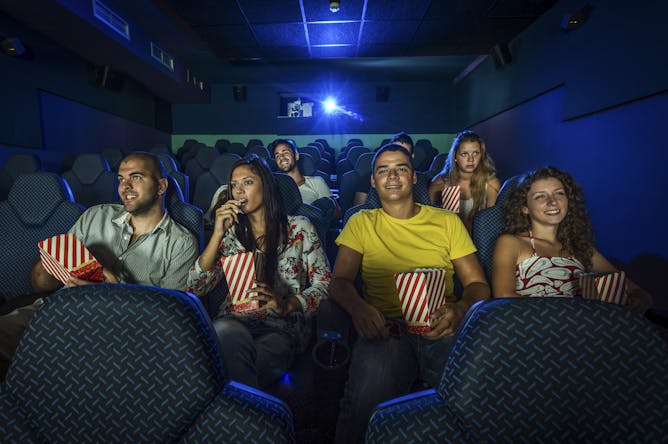|
Top headlines
Lead story
Ever been in a situation – be it at a bar, a dance club, a church or a movie theater – where the noise level felt uncomfortably loud, but everyone around you seemed to act as if it were normal? It turns out that some of these seemingly benign everyday noises are in fact too loud – and are potentially harmful to your hearing.
Cory Portnuff, an audiologist and hearing loss researcher at the University of Colorado Anschutz Medical Campus, pays particular attention to recreational noise exposure. Portnuff explains that while most people associate hearing loss with loud noises in workplace environments such as construction sites, many Americans experience damage to their ears from everyday sounds like fireworks, concerts, off-road vehicles and more. But Portnuff writes that if people are more aware of the risks and take appropriate measures to protect their ears, much of this hearing loss is preventable.
[ Sign up for our weekly Global Economy & Business newsletter, with interesting perspectives from experts around the world. ]
|

|
Amanda Mascarelli
Senior Health and Medicine Editor
|
|

Many movies reach sound levels of 85 decibels and beyond.
GoodLifeStudio/E+ via Getty Images
Cory Portnuff, University of Colorado Anschutz Medical Campus
About 40 million Americans have hearing problems due to exposure to loud sounds.
|
Politics + Society
|
-
Eric Gable, University of Mary Washington; Richard Handler, University of Virginia
Though it is a fact that some enslaved people learned valuable skills, it’s a myth that they had the same path of upward mobility that white laborers enjoyed.
|
|
Science + Technology
|
-
Tam Nguyen, University of Dayton
How do all the different pieces of digital technology you use every day – weather apps, online banking, games and so on – talk to each other? Via application programming interfaces, or APIs.
-
Kellen Chen, University of Arizona
From breast implants to prosthetic knees, implants can trigger a foreign body response that results in your body rejecting them. Suppressing an immune cell gene could reduce this risk.
|
|
Economy + Business
|
-
Joseph K. Nwankpa, Miami University; Pratim Milton Datta, Kent State University
A survey of remote and office workers found that people working from home were more likely to take steps to protect themselves against cybersecurity threats.
|
|
Education
|
-
Clint Randles, University of South Florida
Modern music education is giving students more and more opportunities to create their own tracks.
|
|
Ethics + Religion
|
-
Chance Bonar, Tufts University
The ‘Shepherd of Hermas’ has been accused of being pedantic, even boring. In the first few centuries of Christianity, though, it was a hit.
|
|
Environment + Energy
|
-
Apparao Rao, Clemson University ; Bingan Lu, Hunan University; Mihir Parekh, Clemson University ; Morteza Sabet, Clemson University
Lithium-ion batteries power many electric cars, bikes and scooters. When they are damaged or overheated, they can ignite or explode. Four engineers explain how to handle these devices safety.
|
|
International
|
-
Mike Rogerson, Northumbria University, Newcastle; Belkasem Alkaryani, University of Tobruk; Mahjoor Lone, Northumbria University, Newcastle
Climate models suggest North Africa will get drier in future. But its caves tell a different story.
|
|
|
|
|
|
| |
| |
| |
| |
|
|